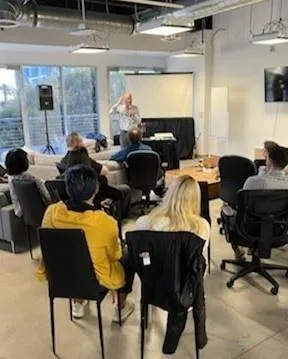
Ravé Strategy Studio


Up-Skill Leaders In Your Organization And Win!
Higher Customer Satisfaction
Better Operational Efficiency
More Product and Work Quality
Less Rework
Higher Productivity
Impact Leaders Blog

In what ways have you seen ego getting in the way of an amazing presentation?
I wanted to see a potential client who is a speaker who was giving a presentation the other day deliver his speech. I have met him a couple of times before. Unfortunately, I was unable to attend because I had a coaching session with a private client. However, I did send someone else to the presentation and told them to give me feedback on how it went. To my surprise, the feedback I received was utterly shocking. Let me put it this way when you are a speaker you shouldn’t focus solely on yourself. Be mindful that your presentation is about giving your audience value.
Many speakers can be self-focused when they are on stage. Most times it is not intentional. But, sometimes speakers can get so wrapped up in delivering their presentations that they forget about the needs of their audience. They focus on the job they feel is most important - the words and slides of their PowerPoint presentation. If a speaker only focuses on those things then the speaker will lose the attention of the audience because there is no connection. A good speaker has to be aware of what is going on in the room at all times.
Do not fall into the bad habit of giving a generic presentation that is not tailored to address the needs of your particular audience. Listeners always know when the speaker has not done their homework, and their response ranges from disappointment to disengaging from your presentation altogether.
You have to give yourself to your audience. Before you even begin to craft your message, you really need to keep in mind who the message is intended for. Do your research and learn as much as you can about your audience as well. The very best speakers make the audience feel great about themselves and don’t worry so much about their own ego.
It’s always a must to respect your audience by leaving your ego at home and not using their time to tell them how much you know and how great you are. Your job is to tell the audience how you can help them and how what you have to say will make difference to their professional and/or personal lives. The only thing your audience wants from you is to connect with you and your message. Connecting really is everything and the way to do so is by treating your audience with the utmost respect.
It does not matter how much of an expert you are or how intelligent you are, giving a presentation is not about you. A speaking presentation is about engaging with your audience to provide them with something useful, thought-provoking, and relevant. At the end of the presentation, your audience will be the judge of whether or not you gave a successful speech.
In what ways have you seen ego getting in the way of an amazing presentation? Please share them in the comments below! I would love to read them.
it is never about you and always about the audience!
Improve leaders in three key areas:

Self-Leadership
Leadership starts from within. Leaders are self-aware and have an honest view of themselves and recognize their impact and influence on others. They lead authentically with personal values, purpose, and vision. Self-leadership means being responsible for results, choices, actions, inactions, behaviors, thoughts, communication, and attitude. It also means demonstrating resilience and consistent performance under pressure.
Training themes include:
Developing Self-Awareness
Developing E.Q. for Sustainable High Performance
Exploring Biases
Being a Self-Starter
Responsibility
Time-Management
Showing up as a leader
Integrity
Inspiring Trust
Power of Networking
Handling Uncertainty and Complexity
Consequences of Power
Handling Stress
Professional Presence
Building Personal Resilience
Owning Your Own Development
Innovative Thinking
Team Leadership
Leaders are effective when they can scale their impact. Effective leaders have the knowledge, skills, and attitudes that engage, motivate, inspire, develop, and empower other people. They demonstrate communication skills for inclusive team engagement, strengthening everyone's ability to adapt with agility, especially in times of stress, uncertainty, "overwhelm."

Training themes include:
Motivating High Performance
Developing & Leading High Performing Teams
Diverse, Inclusive Leadership
Understanding Personality Styles
Being a Team Player
Building Team Resilience
Giving and receiving feedback
Leading Virtual Teams
Effective Storytelling
Crisis Communication
Getting to yes
Influencing Others
Organizational Leadership
Effective leaders communicate a strategy and shared vision that motivates and inspires the people they work with. They actively seek diverse perspectives by collaborating with others both outside and within the organization to drive business results. They balance innovation with smart risk-taking and leverage the strengths of their organization.

Training themes include:
Leading Organizational Culture & Alignment
Outside-In Strategy Development
Strategy Execution During Times of Uncertainty
Driving Organizational Transformation
Enterprise Thinking
Cross-functional Collaboration
Creating the Agile Organization
Driving Innovation
Working through obstacles
Creating Results
Data Driven Decision-Making
M&A Integration
